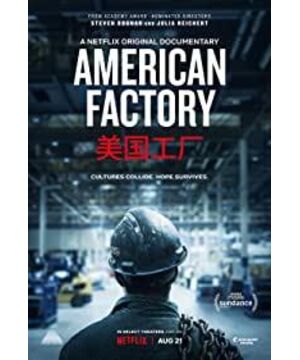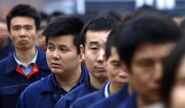The recent documentary "American Factory" about Chinese glass king Cao Dewang leading Chinese employees to open a car glass factory in Ohio, USA, has made a lot of noise on major domestic social media.
This documentary tells the story of this Chinese who brought capital and talent to invest in the United States from the perspective of Cao Dewang, the American management of the manufacturing plant, the Chinese management, the American workers, and the Chinese workers. of. At first glance it seems that the team that made the documentary did not introduce any of its own perspectives. Because of this, everyone has different opinions after watching it: some people see the cultural conflict and difference between China and the United States, some people see the greedy nature of capitalism, some people see Cao Dewang's investment dream broken, and some people see it. American working people are lazy and Chinese working people are industrious.
But don't overlook one point, this documentary was invested and produced by former US President Barack Obama's media company . The film is released on Netflix. Netflix is equivalent to the US version of Tencent Video, with a huge audience both domestically and internationally. Simply put, Obama made this documentary for the American audience. During Obama's administration, his attitude towards China was actually quite tough. He also launched a trade war against China and repeatedly condemned the Chinese government. However, because Obama is a person who is more well versed in diplomacy and speech among many US presidents, he is highly respected in the world, unlike the current US President Trump who is like a mouse crossing the street. But this reminds us that this documentary is not used to praise the efficiency of Chinese-style factories and the industriousness of Chinese workers, or to remind Chinese investors to pay attention to cultural differences and conflicts when they come to the United States to open factories. A lesson for America's blue-collar working class ahead of the 2020 election.
Why does Obama want to teach America's blue-collar class a lesson? Because the blue-collar class in the United States has been an important mass base of support for the Democratic Party in the United States since the Great Depression of the 1920s and 1930s. The protection of the interests of blue-collar workers in the United States is inseparable from labor unions, while labor unions have deep ties with the Democratic Party, but they are increasingly unpopular in the Republican Party. Therefore, the blue-collar working class of the United States, which is spread across the oil extraction industry, coal mining industry, automobile manufacturing industry and steel manufacturing industry, has voted for the Democratic candidate in the general election for nearly a hundred years. Until 2016, they voted for the Republican Party. Candidate Trump.
They chose Trump for several reasons:
- Trump's vulgar speech and behavior make them feel more cordial than the "elite" represented by Obama and Hillary Clinton. Don't think Americans are weird, this trick is also very useful in the UK. The new British Prime Minister Boris Johnson was elected because of his stupid way of speaking and deliberately faked sloppy image to win the goodwill of the people. Boris Johnson is an out-and-out elite class who graduated from private institutions in the UK. It can only be said that politicians are actors.
2. America's blue-collar workers are losing their jobs on a massive scale, so they're angry that the Democrats aren't helping them in their best interests. They feel their jobs are being taken away by new immigrants to America, by Mexicans and Chinese. That's why at the beginning of the documentary, we see more than 10,000 workers at General Motors in the United States who are unemployed and desperate for a job to support themselves and their families.
What this "American Factory" wants to tell the blue-collar class in the United States is that the decline of American manufacturing is not the fault of the Democratic Party, but that American manufacturing capital abandoned local American workers in order to maximize profits, and actively chose to Production moved to China. The reason for choosing China is simple, the cost of Chinese workers is much lower than that of American workers. That's why the documentary has these shots:
Scene 1: Chinese workers think it is normal to be injured at work and there is no big problem
Shot 2: Management from China believes that American workers are inefficient
Scene 3: Chinese workers think that American workers cannot endure hardship and are afraid of heat
Scene 4: Chinese workers cannot take vacations for production efficiency, and there are no holidays.
In our opinion, this is the spirit of Chinese people who bear hardships and stand hard work. In the film, a Chinese management leader explained to everyone that because Americans grew up under the doting of their parents, they always felt that they deserved a lot of things, so they liked to complain, and they were not as hardworking as Chinese working people.
But the American workers in the factory didn't see it that way, and the target audience for the documentary, the American audience, didn't think so either.
Rob, an American worker, thinks that the Chinese workers who go to the United States pay a lot, which is unimaginable for him.
Working in a 200-degree Fahrenheit (about 93-degree Celsius) workshop every hour is pretty exaggerated.
It is "unbelievable" that glass recycling workers in China are not wearing any protective measures other than gloves.
In the following American worker's more than ten years of work experience, the only experience of being injured at work was in a Chinese-owned Fuyao...
So what exactly is this documentary trying to tell Americans?
It wants to tell Americans that the reason why China has become a big manufacturing country is that Chinese workers at the bottom have paid unbelievable and unacceptable efforts in the eyes of Americans. And the blue-collar workers in the United States, if they want to revive their own manufacturing industries and return to their jobs, can they make such sacrifices to Chinese workers?
In fact, the answer has already been given in the film: Americans simply do not recognize or accept this kind of payment, and it is not even legal. Fuyao's American workers didn't accept it either, so they began to complain to the relevant local government departments and began to ask to join the union.
In the United States, unionization of blue-collar workers is almost a necessity. Because the union can guarantee that your hard work is not only the minimum wage of more than ten dollars an hour stipulated by law, but also guarantees the safety of your working environment and guarantees that you will receive full compensation for work-related injuries. Without unions, American workers have no guarantee of any rights. But for Fuyao, or the entire manufacturing industry, the involvement of labor unions means a huge loss of profits. So in the end, the union organization failed within Fuyao, and those activists who wanted Fuyao to join the union were also "punished" to some extent.
So this documentary is actually asking American blue-collar workers, do you really want to be a manufacturing worker? Do you really think America should revive manufacturing?
In fact, the leftists, liberals, Democrats, and elites in the United States have always advocated the further transformation of the United States into the tertiary industry through educational innovation. But "change" is difficult for many Americans who are accustomed to their own way of life and state.
Of course, there are definitely some deviations from the perspective of this documentary. In the United States, all film and television works or news reports that focus on any friction between white races and other minorities will have an unavoidable controversy, which is the widespread problem of racial discrimination in American society. The Chinese are a minority in the United States, a vulnerable group that often suffers from all kinds of overt and covert racial discrimination. But from this documentary, it seems that the Chinese are discriminating against Americans:
For example, the Chinese believe that Americans are slow in production because their fingers are large and inflexible;
Chinese workers believe that Americans are more afraid of heat than Chinese because of their physical fitness;
Chinese managers think that Americans grew up under the doting of their parents, so they are lazy and do not have the spirit to bear hardships and stand hard work;
Cao Dewang thinks that American managers are not trustworthy with their elbows turned out, and so on.
Such remarks are considered racist in the eyes of American liberals. Only this time, the discriminator and the discriminated person have reversed their positions, which must make Americans look quite uncomfortable.
"American Factory", have you read it?
*If you like my articles and want to know more relevant American social and cultural information, as well as the content of studying abroad, you can follow my WeChat public account MOBY to study in the United States.
View more about American Factory reviews








